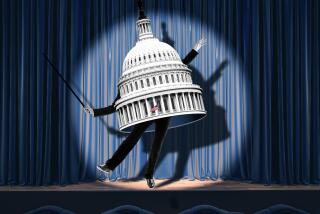U.S. Arts Support Provides Model for British
- Share via
Richard Luce, tall, slim, gray-suited minister for the Arts and minister of State, Privy Council Office, and by any titles the very model of British officialdom, made a flying visit to Los Angeles last week to talk with arts-community leaders.
Luce met with officials at the Getty Museum, KCET-TV, City Hall and other establishments where support of the arts is, in one form or another, Topic A.
The British tradition, as on the Continent, has been for government support of the arts, with few, if any, income-tax breaks for private donors. Now, the minister says, Her Majesty’s Government is at last moving to encourage the private sector to lend a major hand to the arts.
The move can be seen as another area of philosophical agreement between the Conservative government of Margaret Thatcher and the Republican administrations of Ronald Reagan and now George Bush.
Early in his first term, Reagan established a council of arts advisers to encourage private-sector giving, as against any expansion of the government’s role in the arts (never, by European standards, very substantial relative to the rest of government spending). Through the Arts Council, the British government disperses about $720 million annually to arts institutions, from the Royal Shakespeare Company to the Tate Gallery. Another $800 million goes directly to local authorities for libraries and other establishments.
But the percentage of government support for most arts institutions has dropped, Luce admits. The Royal Shakespeare Company used to get 40% to 50% of its annual operating budget from the Arts Council. It is now 30%. The Royal Opera has dropped comparably, from 50% to 42%.
Cries of distress from the RSC and other companies have been widely heard.
The tax-deductible individual contribution by which most U.S. arts organizations survive is still no part of British tax laws. But, Luce says, there have been some changes made. A payroll deduction system for support of the arts provides some tax relief. A covenant system, pledging contributions of a period of years, gives tax benefits.
“Private-sector giving has doubled over the last 10 years,” says Luce, “but this was starting from a very low base.”
The Thatcher government has lowered tax rates dramatically. “The top used to be 98% on investment income, 83% on earned income. The rates are now in the 25% to 40% range. There’s more money in a lot of pockets. We’re anxious that some of it should go to the arts. The habit of giving needs encouragement.”
Corporate support of the arts has gone from $800,000 to nearly $60 million in a decade, Luce says. Some of this was encouraged by a government matching-grants scheme that rewards first-time participants with a tax break.
“The program drew 1,000 sponsors in its first four years,” Luce says, “and 90% of the companies have stayed in the program.”
Problems remain. There are few charitable foundations on the U.S. model, and few arts organizations have endowment funds. “We hope to get there by the end of the century,” the minister says.
There have been some significant public-private partnerships, including a $29-million refurbishing of the Imperial War Museum, achieved with matching grants and donations from Arco and Dr. Armand Hammer, among others.
If the arts are agreed to be one measure of the quality of life, Luce says, they are also proving an important factor in the regeneration of cities. The Tate Gallery extension in Liverpool has given the city a remarkable lift, and arts institutions are planned as the centerpieces of a revitalized Glasgow in the 1990s. A massive London Library is under construction near St. Pancras Station, part of a major redevelopment of the area.
The Arts Council as the funnel for arts funding gives the government an arm’s length relationship with the arts, as do the National Endowments for the Arts and the Humanities in the United States. But, as the recent furor in Washington over “obscene” art has shown, the arm is still powerfully attached to the government.
And the control of funding is life or death (or serious maiming) for the arts. For a time, Britain’s arts community looked to be having the worst of both worlds: Little if any private support and sharply reduced government support. Now, the minister says, the government and the arts are readjusting for the ‘90s.
More to Read
The biggest entertainment stories
Get our big stories about Hollywood, film, television, music, arts, culture and more right in your inbox as soon as they publish.
You may occasionally receive promotional content from the Los Angeles Times.









